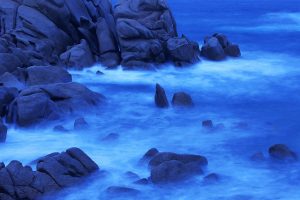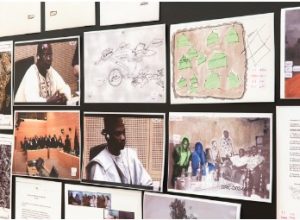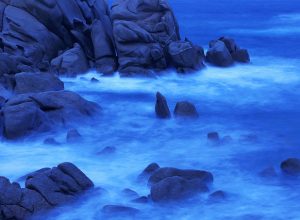
At a time when people are asking themselves about the status of living and nonliving beings, of the human and the nonhuman, things are of concern to us as active agents of the world that act upon us as much as we act upon them.
Marielle Macé restores to poets the freshness of their endeavor, that of treating things otherwise, of gazing at them, of listening to them, of hearing them as we ought to. In the parliament of things Bruno Latour has called for, she summons to the bar things that may serve as witnesses as well as those things that will lodge accusations: the Mediterranean Sea, to take one example. Her poetic path requires not that things be made to speak as we would speak but that we might take them into consideration, standing, with tact and imagination, “at the edge” of an exchange.
Laurence Bertrand Dorléac
Enlargement
of Poems
Marielle Macé
Anthropology has enlarged considerably its objects of investigation. With its “ontological” turn, it invites one to recognize the subject status of nonhuman life, but also of nonliving beings, by endowing them with an interiority, a capacity to signify, an “agency.” Being a stone, a river, a machine, an animal are so many modes of being now gathered together onto one and the same ontological and political stage, since it is with each of these life forms that we have to connect ourselves and since it is a matter, therefore, of lending an ear to each one of these things (in its silence).
The world does indeed have ideas, lots of them that stir it, that flutter at the very surface of existence. And it is because the world has many ideas that it rustles with emancipatory potential: there are more ideas on Earth than one imagines, ideas right down on the earth, right next to things, for every life form hazards its idea, conducts itself in a certain way, draws a line, formulates what it has to say, and declares that one could very well have lived quite otherwise, like this, like that, and again like this. In this respect, things reputed to be mute do indeed speak volumes. The Earth in particular shouts, cries out, makes itself heard, rears up, and offers forth; and it is in listening to all this that today’s ecopolitics is invented.
And yet, where is one to find some allies in order to build up this audience? How is one to hear what does not speak without pretending it has a language of its own? I am betting that here the poets are one step ahead. For, these worldly things, which cry out so loudly that one treats them otherwise, are quite ancient lyric things. Here, poetry is highly learned, even expert—it is enlargement itself.
So, how does one hear these ideas the world has? How is one to hear, for example, the still mute discourse of water—and in particular what the terrifying silence of the Mediterranean Sea really has to say? It suffices, perhaps, to question it, to summon it to appear in court—to appear, for example, at the trial intended to determine responsibility for the lives lost on our coastlines. No doubt, water cannot respond, but it can answer for, come before the bar, testify, even accuse, if one sets oneself to listening to that which, quite concretely, its silence and its opacity recall. Indeed, water does not just entomb; it retains, preserves, and envelops what curls up, thereby remembering and therefore being capable of testifying. To listen to what water has to say is to listen to this testimony, to have to hear this quite new testimony (for, the Mediterranean Sea said something entirely else beforehand). It is not only that it now moans and groans; it lodges its complaint. It groans out, gathering in its plaintive complaint and sustaining it. The tons of plastic it now contains groan out—lodging a counterfeiting complaint for having forged a false seascape, for having disfigured the very figure of our myths, disfigured the cosmos. Washed up craft groan out. Drowned bodies, evidently, lodge their complaint.
In order to hear its nonspeech speak, a mixture of scrupulousness and audacity is required. This is what is shown, in another space, by the Chilean documentary film maker Patricio Guzmán in his documentary The Pearl Button (2015), which alternates several watery voices, several “watery ways”: discovery of the tortured, drowned bodies of the desaparecidos; honoring the know-how of the indigenous peoples of South Chile; bringing one’s gaze to bear upon blocks of quartz that, thousands of years ago, captured some bubbles of water; reporting the fact that his country, Chile, contains more than 4,000 kilometers of coastline but has fallen out of love with the ocean, and that, in its northern regions, it supports the most arid desert in the world. All these voices make themselves heard, and their chorus converges around the obvious fact that water has a “memory.” Water memory was the name given in 1981 to Jacques Benveniste’s hypothesis that water placed in contact with certain substances retains the imprint of their properties. While it seems that today this hypothesis is unanimously considered fanciful, with Guzmán the somewhat dubious theme of water memory becomes entirely politicized, thereby restoring its conflictual force, for such memory is called upon to testify—called upon, I would insist, to appear before the bar and cry out for justice.
Indeed, it is not only that water remembers, that it changes course, reliquifies around that with which it comes into contact. It is that it has been a witness and that, being a witness, it is summoned to testify publicly and is listened to. These efforts to hear the discourse of water are not efforts to fictionalize a bit of speech but to begin to listen to something that, as a matter of fact, does not have the gift of speech and yet knows a lot and could, in its silence, vouch for us and for our humanity. “A single vessel will answer all,” Henri Michaux posited in a line made for us.
This is also what has guided the Forensic Oceanography project Charles Heller and Lorenzo Pezzani contrived when they mounted the crow’s nest and turned themselves into lookouts for the lives lost in the Mediterranean Sea, champions of their rights, and, consequently, guardians of the guardians. These geographers looked into the case of “the left-to-die boat.” This migrant-laden ship drifted for fourteen days in 2011 within a NATO-monitored maritime zone, sent out multiple signals, was identified several times, received a visit from a helicopter, and crossed paths with a military vessel but never was extended any assistance. In a silent eclipse of jurisdictions and a fragmentation of supervisory spaces at the edge of all responsibility, sixty-three migrants met their deaths. Ignored, these lives nonetheless left their traces in the waters, including distress calls, and by attentively deciphering those traces one can transform the sea itself “into a witness for interrogation.”
Listening to the ideas of the world today really is that: listening to the cry of Gaia, the moans of the Mediterranean. Or, it is asking oneself seriously what it is to be a bank, to be a river, to be a rock, to be a forest, knowing what the Earth would say—not whether it was speaking but, more simply (as Vinciane Despret posited apropos of animals), whether one was asking the right questions.
To be a river, Essere fiume, is the title of a splendid work by Giuseppe Penone, who juxtaposes there two stones of identical shape; the size of the first was given to it by years spent in contact with water, the size of the second by a sculptor who reproduces and goes back over this effort and who “makes the river” as an animal would be made. And being a river is, here, a state of the stone, a memory the stone has, an idea of the stone, a dream of the stone itself. I am thinking now of another work by Penone, Idee di pietra (Ideas of stones), which represents a tree bearing, by way of leaves, heavy blocks of granite, stones that dream of being leaves—like those trees of Francis Ponge that began dreaming that their leaves were birds, that they had known how to do that.
A string of words dot the landscape here: “being a river,” “being a stone,” “thinking like a tree” (Jacques Tassin), “thinking like a mountain” (Aldo Leopold), “learning to speak to a stone” (Annie Dillard), “thinking like a rat” (Vinciane Despret), and so on. This is a place where the enlargement of the sensory world, and the politicization of the very idea of nature, will always be said in verbs, not in names, whether “proper” names or common ones. For, it is not a question of christening them or of bringing the world’s things to Adam for naming but of letting them dream, of allowing them to state their idea.
Thinking like a forest. Not even asking whether forests think, but positing that they do so. That is the full contention of Eduardo Kohn in How Forests Think, a book that is exemplary of this decision to enlarge the parliament of life. To say “to think” is undoubtedly to say too much (as has been much held against Kohn). Other verbs would be required, as well as greater self-restraint and more imagination, in order to catch the echo of what Jacques Lacan called “the signifier of nature.” But what really matters here is the decision to honor other ways of comporting oneself in the sensory world and in the world of meaning [le sens]. And it is in this respect that the infinitive or the “as” is right. The infinitive is the mode of participation, of the flowing of one style of being into another. The “as” makes the relationship all while maintaining the gap; it tells us that one will not figure out anything yet one still makes the attempt, one still makes an approach, and one tries to follow these ideas life has. And we do so not by simulating these other forms of interiority, by believing that we have found accommodations therein and that we have reduplicated the experience thereof, but, from our own site of language, by hypothesizing these other thoughts and our encounter, our alliance, our collaboration (but also our conflicts) therewith.
Now, I believe that poetry has its word (and more than just one word) to say in this process of enlargement, for poetry is in its entirety enlargement, largesse. And it is so especially when it dares address itself to what will be unable to respond, to what does not hear, to what does not even exist, or no longer exists—all “things” the poets fear neither to listen to nor to question, though they refuse to make them speak, taking note precisely of the fact that these things do not speak and yet they no less continue to think about them.
Here we have what is the daily fare of poetic effort. Or, rather, this is the poem’s reasonable folly. Or, yet again, this is a poem’s tranquil animism, its force of ecopoetic truth that is so precious today: drawing up a spoken scene wherein one listens to what is not saying anything and signifies still, not by “giving voice” thereto but by allowing it to phrase itself after its own manner. This is a scene wherein one address oneself to what will thus not respond, does not hear, and perhaps does not even exist. A poem sets its speech on what would know not how to speak; like Jacques Roubaud, who devoted a poem to his deceased wife, it obstinately “hypothesizes a response, hypothesizes an encounter, hypothesizes a someone.”
For a poet, indeed, there is nothing strange about listening to the thoughts of water (or of a tree, of time, of the dead), nothing strange about addressing oneself to them, or even ordering them about. Alphonse de Lamartine commands time to postpone its flight; Michaud, Roubaud, and Michel Deguy gently tell a deceased wife not to fear no longer being anything, since “the two of us” still exists. Ponge challenges a tree to change its expression: “Try another leaf! —The same one! Still another one! The same one!” Valère Novarina addresses a “speech to animals” (Discours aux animaux). He does not ape the speech of animals, does not make them speak, but, rather, adjusts his own speech to their presence, to their way of being, to the gravity of their nonspeech.
Yet I would insist that these poets know that there will be no response, no “speaking,” in any case not like that, not like us, and that one will never figure anything out. They do not pretend that we might be able to converse with beasts or with things. What is it, for example, to say “You” to the deceased, what is it to build up this interlocutory relationship without forcing it? That is what a poem is there for: for instituting a syntactic scene in which one will attempt some syntactic connections until one finds the right one, in which one will stand at the edge of this exchange, and in which one will know that one is not entirely entitled to such an exchange.
For that, one needs as much imagination as one needs tact. Imagination is needed in order for one to lend an ear to these ideas the world has, this world that is decidedly not lacking therein. And tact is needed in the face of these nonwords, a tact that leads them to hold at bay unscrupulous songs, songs that believe that they know how to make everything speak in our place and that they would be able to do so. Tact is required because today there are many beings one knows not how to name: states of life, erratic metamorphoses of life, hybrids, bizarre outcomes one must be wary of categorizing too quickly, so as to comply with our metamorphic times. (As Philippe Descola and Baptiste Morizot plead, one would have to put up with this moment of instability in which one does not know what relationships one is to entertain with these life forms, but in which one has a presentiment that here we have one of the key political stakes of our time.) Thus, one should not hasten to stabilize relationships or to change nonhumans into humans; one should rethink possible connections, feeling things out as is fitting while relaunching the imagination.
I am convinced that, in the precision of its ways of “handling language” (to quote Paul Valéry),[1] poetry caters to this mixture of tact and imagination, and that it is to poetry, too, that one must make up one’s mind to lend an ear.
Selected Bibliography
Bailly, Jean-Christophe. L’Élargissement du poème. Paris: Bourgois, 2015.
Daston, Lorraine. Ed. Things That Talk: Object Lessons from Art and Science. New York: Zone Books, 2004.
Descola, Philippe. Beyond Nature and Culture. 2005. Trans. Janet Lloyd. Foreword, Marshall Sahlins. Chicago and London: University of Chicago Press, 2013.
Despret, Vinciane. What Would Animals Say If We Asked the Right Questions? 2012. Trans. Brett Buchanan. Foreword, Bruno Latour. Minneapolis and London: University of Minnesota Press, 2016.
Être pierre. Exhibition catalogue. Zadkine Museum. September 29, 2017-February 11, 2018. Paris Musées, 2017.
Gell, Alfred. Art and Agency: An Anthropological Theory. Oxford and New York: Clarendon Press, 1998.
Guzman, Patrizio. The Pearl Button (El Botón de nácar). Documentary film. Chile, 2015.
Heller, Charles, and Lorenzo Pezzani. “Liquid Traces: Investigating the Deaths of Migrants at the EU’s Maritime Frontier.” Revue Européenne des Migrations Internationales, 30:3/4 (2014): 71-107.
Kohn, Eduardo. How Forests Think: Towards an Anthropology Beyond the Human. Berkeley: University of California Press, 2013.
Roubaud, Jacques. Quelque chose noir. Paris: Gallimard, 1986.
Marielle Macé teaches literature at the École des Hautes Études en Sciences Sociales, where she is a thesis advisor. She is also a Guest Professor at New York University. Macé is on the staff of the reviews Critique (Minuit) and Po&sie (Belin). Her work bears on the genre of the essay, the literary memoire, and uses of literature, as well as on a renewal of thinking about style, enlarged from the domain of art to the adequate description and evaluation of life forms in their intractable plurality. Her books take literature to be an ally in an effort to understand our forms of common life and the conflicting values that clash there. Among her publications are: Le Temps de l’essai (Belin, 2006), Façons de lire, manières d’être (Gallimard, 2011), Styles. Critique de nos formes de vie (Gallimard, 2016), “Nous” (Critique, 841-842 [2017]), Sidérer, considérer. Migrants en France, 2017 (Verdier, 2017), Les Noues (Verdier, forthcoming).
[1]Translator’s Note: Paul Valéry’s phrase “the handling of language” appears in “Asides” published in Analects, from The Collected Works of Paul Valéry, vol. 14, ed. Jackson Mathews, trans. W. H. Auden (London: Routledge & Kegan Paul Ltd., 1970), p. 15. The original French is, rather, a plural noun: manœuvres de langage. See: http://aphelis.net/la-manoeuvre-du-langage-handling-language-paul-valery-1932/


